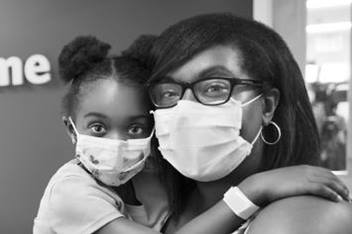Hospital Admission for COVID-19 (Coronavirus Disease 2019)
Coronaviruses are one of the causes of mild respiratory disease, like the common cold. Your child has been hospitalized with COVID-19, which is caused by the virus SARS-CoV-2 (severe acute respiratory syndrome-Coronavirus 2).
What to Expect in the Hospital
- Nursing staff will be checking on your child often. Staff will wear masks, gowns, gloves, and eye protection. This will help prevent the spread of the virus.
- Staff will check your child’s temperature, heart rate, and blood pressure often. They will watch your child’s breathing closely and watch for problems, like fast breathing or increased effort when breathing.
- Doctors may order lab tests and other treatments, such as medicines to lower fevers or help with breathing.
- This virus is very easily spread from person-to-person (contagious), so your child must stay in the room. If your child needs to leave the room for tests or procedures, they will wear a mask. Children younger than 2 years of age should not wear a mask.
- Handwashing for patients and visitors is very important. The health care team will wash their hands or use sanitizer often. It is important for you to wash your hands often, too.
Follow these guidelines:- Use soap and water for at least 20 seconds. Rub your hands together, making sure to scrub all parts, especially between your fingers and under your nails.
- Alcohol-based hand sanitizer is a good choice, too. Again, rub your hands together, making sure to cover all surfaces. Allow to dry.
Visitors
Visitors must follow the policies for infection prevention in order to visit. Follow these rules to slow the spread of infection:
- If a visitor has symptoms of illness or COVID-19, they should refrain from visiting while ill. All visitors should check for the following symptoms before coming to the hospital:
- Fever (temperature of 100.4° Fahrenheit (F) or 38° Celsius (C) or higher)
- New or worsening chronic cough
- Sore throat
- Muscle soreness
- Shortness of breath
- Vomiting and/or diarrhea
- Visitors must stay in the patient room as much as possible. Meals can be delivered to the room through Kaleidoscope Cuisine. Staff will give you a guest menu. You will dial 25852 from the room or use the GetWell Network (on the TV) to place an order. It is best to use a credit or debit card to limit contact with others. If cash or a Kaleidoscope card must be used, we will use extra precautions. You may also bring in food on some units. Ask your nurse about this.
- The visitor may use the bathroom facilities in the patient’s room, if available.
Personal Protective Equipment (PPE)
Personal protective equipment (PPE) includes masks, gloves, and gowns.
- Visitors may be asked to wear a mask when in the patient’s room except when eating, drinking, or sleeping.
- Masks should be worn when a patient is being transported outside the room.
- Some procedures are done in the room. Visitors may be asked to wear PPE.
How to Prevent the Spread of COVID-19
Monitor yourself and any other people at home for the symptoms described in the “Visitors” section on page 2. If symptoms start, tell a health care provider. Let them know about the contact with a person who has COVID-19. This will help the provider decide the safest way to give care.
- Cover your mouth and nose with a tissue when you sneeze or cough. Throw away the tissue and wash your hands immediately. If you do not have a tissue, sneeze or cough into your elbow and wash your hands.
- Avoid touching your face (eyes, nose, and mouth) as much as possible.
- Stay away from others who are sick. Anyone who is sick in the home should stay in a separate room and use a separate bathroom, if possible. Be sure to wash your hands and clean high-touch surfaces often.
- When your child is discharged, we will give you the Helping Hand I-467 Hospital Discharge for Coronavirus (COVID-19). This will give you instructions on what to do at home.
Resources for More COVID-19 Information
- See the Centers for Disease Control (CDC) website (www.cdc.gov) for the most up-to-date information about COVID-19.
- The 700 Children’s Blog is another resource that can help answer your questions. You can find it on our website (www.nationwidechildrens.org). Once you are on the main hospital page, search for COVID-19.
Helping Hands™ Patient Education Materials
Helping Hands™ are easy-to-read guides about different illnesses, therapies, surgeries, and more. They’re created by the Patient Education team at Nationwide Children’s Hospital and are reviewed and approved by clinical staff, like nurses, doctors, pharmacists, and psychologists. Nationwide Children's Hospital is not responsible for misuse of information in patient education materials, including Helping Hands.
HH-I-468 | ©4/13/2020, revised 5/29/2025, Nationwide Children’s Hospital


